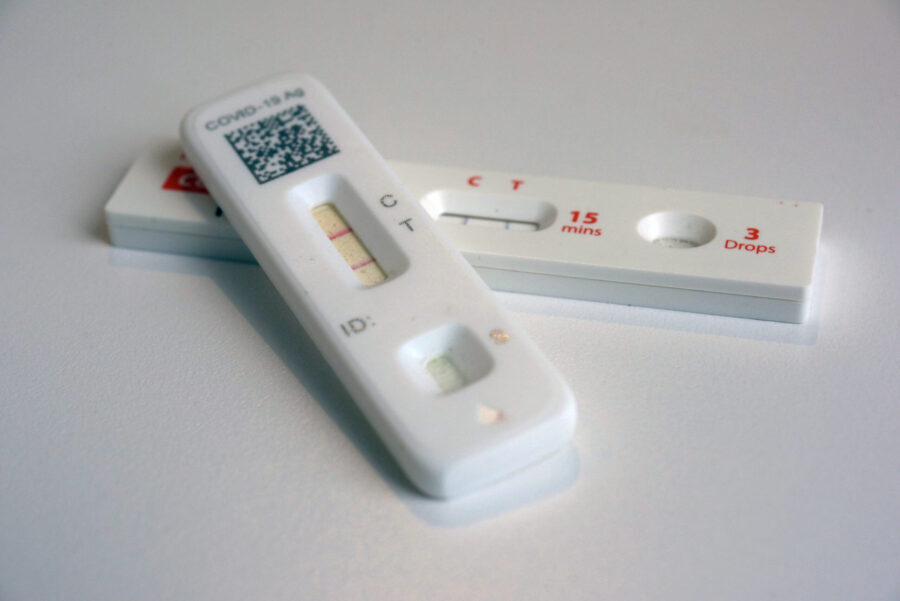COVID-19 ‘Long Haulers’ Face Mental Health Challenges
Nov 20, 2020, 6:40 PM | Updated: Feb 10, 2021, 10:34 pm
OGDEN, Utah – If you think COVID-19 is just a physical illness, think again. Utahns trapped in the endless cycle of its long-term side effects are struggling to process what may be permanent limitations and changes to their everyday lives.
Change is scary. Young single mom Jennifer Hunter faces uncertainty daily. She uses a special device called a pulse oximeter to measure her oxygen saturation from home.
“I think that’s probably the hardest part, seeing where you were a few months ago to where you are now,” said Hunter, who lives in Ogden.
Last June, while training for a half marathon, she got COVID-19. She had just run ten miles and was in great shape. Before her test results were even in, the virus put her in the ICU with 30 blood clots in her lungs.
“You wonder if this is the new normal or if you’re ever going to get that old you back,” Hunter said. Five months later, Jennifer still has shortness of breath, fatigue, and low oxygen.
“My sister, not long ago told me I needed to stop being a victim and just get over it, and like, I really wish I could just get over it,” Hunter said.
Dr. Kristin Francis, assistant professor of Psychiatry, University of Utah Neuropsychiatric Institute, said long-term complications from COVID-19 can be depleting.
“A sense of hopelessness, worthlessness, even thoughts of suicide can definitely happen with an abrupt change,” Francis said.
Cutting back to cope is important, she said.
“Just having a sense that that’s okay for now, and that by having a moderation approach to your lifestyle, you can then gradually add those things back in over time,” she said.
Saralee Johnston, a mother of two sons who lives in Salt Lake City, has been sick for eight months post-COVID-19. She quit her job in the biomedical field to manage her erratic heart rate and periodic blindness. “I start to doubt myself and think maybe I’m just a little crazy. Maybe I’m paranoid. That’s been a disturbing thing… how much it’s made me doubt myself.”
Joining support groups and practicing mindfulness are key, Francis said.
“To be able to experience the moment to let go of a lot of the stress and anxiety that’s weighing them down, and to live in the present,” she said.
This is Kurt Rowley’s second go-round with post-viral illness, after contracting H3N2 in the 90s. This time his long-term complications are from COVID-19. “It looks a lot like a mental illness to have this but it’s definitely not because treating it like a mental illness doesn’t work,” said Rowley, who lives in Syracuse. “There are biomarkers that prove it’s not a mental illness.”
Experts recommend COVID-19 “long haulers” are direct with loved ones about their needs. She recommends setting boundaries and saying something like, “‘It’s not helpful. It’s hurtful for me. And it’s not, it’s not supportive in the way that I need,’” Francis said.
Francis recommends people with long term complications set realistic expectations for themselves, follow a schedule, pay attention to sleeping and eating regularly, and practice self-care.
Caregiver fatigue, when those helping long haulers are fizzling out and too tired to help anymore, creates an added challenge. Francis recommends watching for signs of irritability, short answers, and unavailability.
“I think it’s okay to point those things out and to also make sure that they’re getting the breaks and support that they need,” Francis said. “Rotating caregivers is really helpful, especially with someone who is experiencing some of those long hauler symptoms.”
Allowing others to step in will lighten caregivers’ load and lessen fatigue.
“That is a gift that you give them and it, you know, gives it back to you,” she said.
Francis said it all comes down to vulnerability. By letting people in, and being clear about your needs, relationships can strengthen while the person suffering long-term COVID-19 complications heals.
Coronavirus Resources
Have you or a family member been affected by coronavirus issues in Utah? KSL wants to hear from you. Contact KSL by emailing social@ksl.com.
What is COVID-19? Here’s What You Need To Know To Stay Healthy: ksltv.com/432037/what-is-covid-19/
Latest coronavirus stories from KSL can be found at ksltv.com/coronavirus/.
Where in the world has the coronavirus already appeared? See the map: ksltv.com/?p=432035
Your Life Your Health: How can parents prepare their home, children against coronavirus: ksltv.com/?p=432060
How do I prevent it?
The CDC has some simple recommendations, most of which are the same for preventing other respiratory illnesses or the flu:
- Avoid close contact with people who may be sick
- Avoid touching your face
- Stay home when you are sick
- Cover your cough or sneeze with a tissue and then throw the tissue in the trash
- Wash your hands often with soap and water for at least 20 seconds, especially after going to the bathroom, before eating, and after blowing your nose, coughing or sneezing. Always wash your hands with soap and water if your hands are visibly dirty.
- If soap and water is not readily available, use an alcohol-based hand sanitizer with at least 60% alcohol.
The CDC recommends wearing cloth face coverings in public settings where other social distancing measures are difficult to maintain (e.g., grocery stores and pharmacies), especially in areas of significant community-based transmission.











